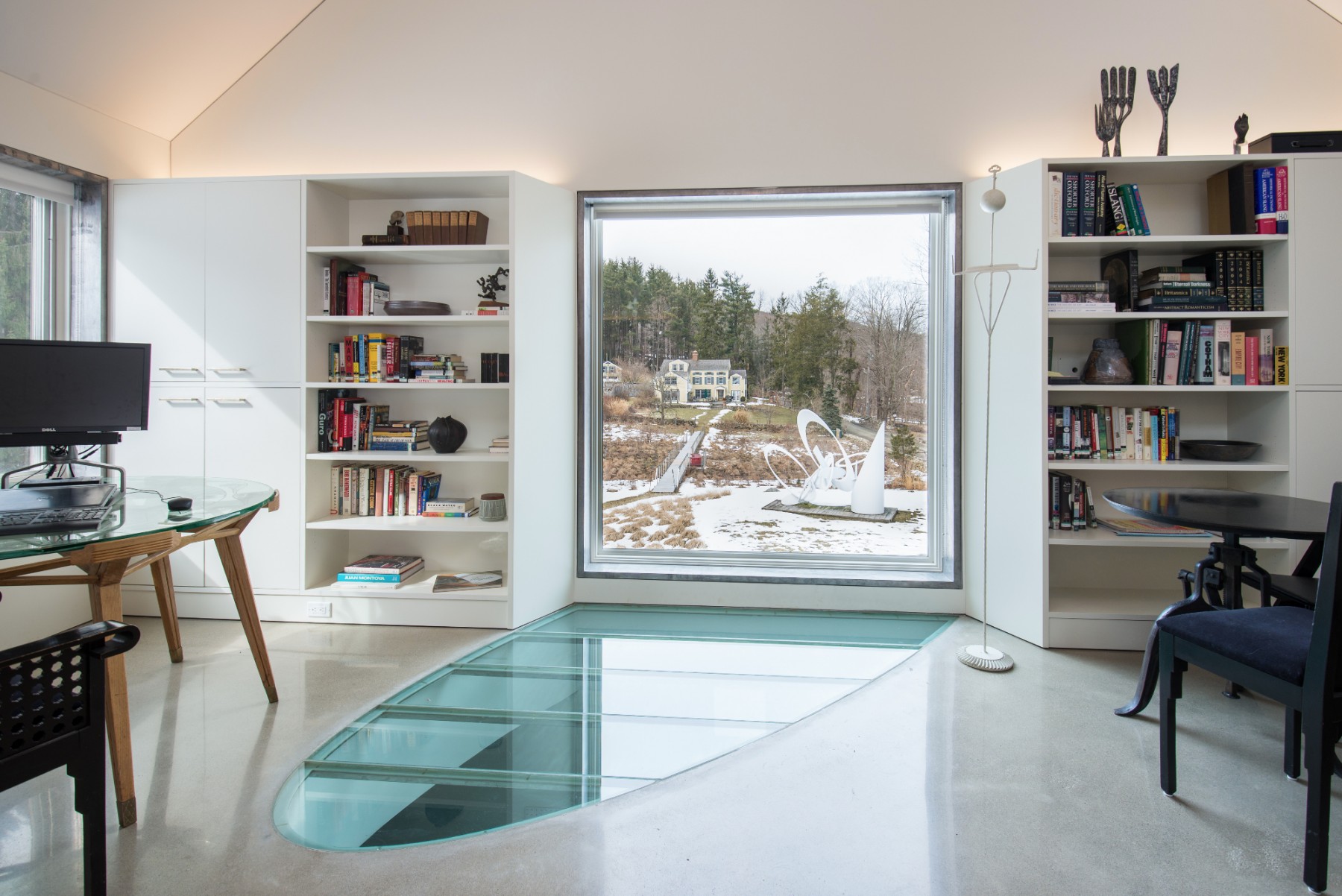Top Glass Flooring Benefits
- Details
18 Glass Flooring Benefits to Make You Forget Wood, Laminate, or Tile
Are you designing or renovating a commercial space or private residence? Want to instantly add a bit of drama, elegance, sophistication, and style? Then consider the numerous glass flooring benefits and whether this hot design trend would be right for your space.
Benefits of Glass Flooring
- Safety
- Durability
- Corrosion Resistance
- Weather Resistance
- Aesthetics
- Modern Design
- Compatibility with Other Building Material
- Illusion of Space
- Unique Design
- Natural Light
- Environmental Benefits
- Cleaning and Maintenance
- Customizable
- Natural Insulator
- Hydrophobic Material
- Stain Resistance
- Hard Water Etching Resistance
- Impact Resistance
18 Reasons Homeowners and Businesses Are Choosing Glass Flooring
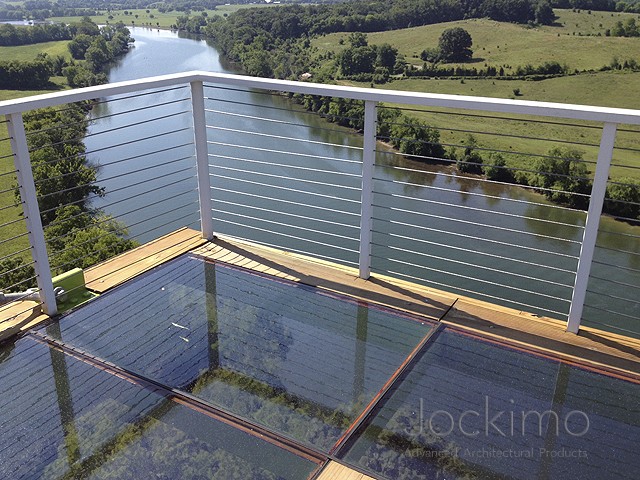
When you’re looking down and there’s nothing but open space for several stories beneath your feet, it’s logical to wonder, Wait. Are glass floors safe?
The answer: yes!
When they are designed, manufactured, and installed by experienced professionals, glass floors are every bit as safe as any other type of flooring.
When deciding on a glass floor, make sure your manufacturer is accounting for these three important safety features:
- Anti-slip glass surface
- Failure redundancy engineered into the glass panel design
- Appropriate glass thickness
You might think of glass as fragile because of all those wine glasses you’ve shattered out of the dishwasher. When used as architectural glass in flooring, however, it’s actually designed and manufactured to be a highly durable material.
Even with heavy commercial traffic, glass flooring can withstand everyday wear and tear. To keep it looking pristine, make sure your manufacturing is applying an anti-scratch coating.
Because it’s resistant to chipping, cracking, scuffing, or scratching, glass floors are a durable option for either private residences or businesses.
Because glass is a corrosion-resistant material, you don’t have to worry about oxidation or any other chemical reaction that will deteriorate the material.
Even when it’s used in external glass flooring or walkable skylights, exposure to the elements will not cause any corrosion to the glass panels.
This means two things. One, you get a product that looks pristine for a longer amount of time. Two, you don’t have to worry about investing needless time, money, or energy in repairing, treating, or protecting your glass floors.
Whenever selecting materials that will be used outdoors, it’s important to think about how that material will interact with the elements.
- Extreme temperature fluctuations
- Wind or flying debris
- Snow, ice, or sleet
- Rain
- Intense sun
Even when exposed to the harshest of these elements, glass floor panels will not bend, warp, or corrode.
That’s not always the case with every flooring material. Natural wood, for example, can eventually rot, splinter, or warp under the fluctuations of the seasons.
If you’re looking for longevity in your outdoor flooring, glass should be on your short list of potential materials.
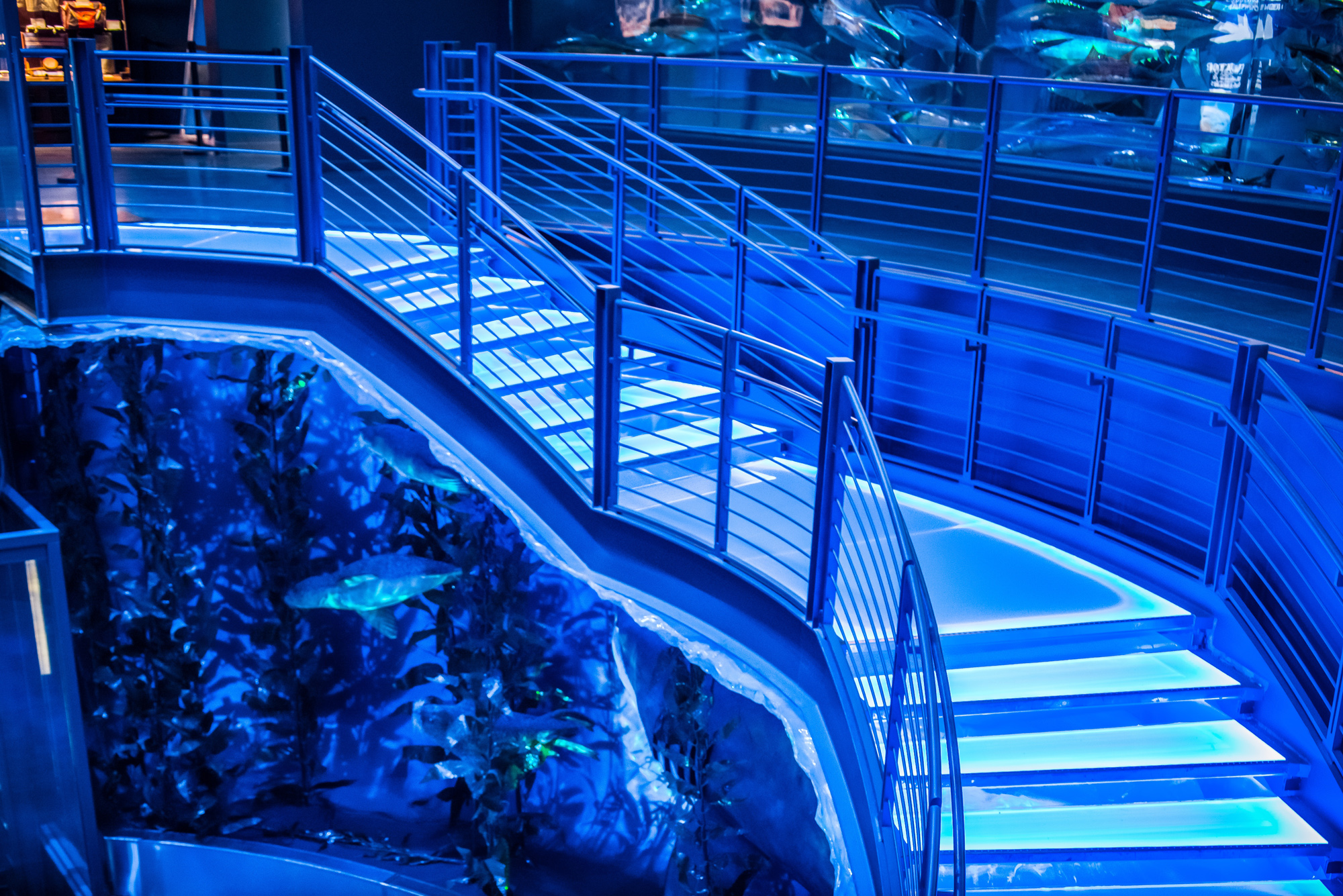
Glass floors are many things. Dramatic. Stunning. Bold. Timeless. Unique.
One of the biggest benefits of adding them to a residential or commercial space is the aesthetic payoff. Glass floors are simply beautiful. The clean lines and the minimalistic design make them appealing but also striking enough to be eye catching.
If you enjoy a sleek, minimalistic, modern design, you can’t beat glass. Glass floors have the unique ability to be simultaneously contemporary and timeless.
Architectural glass has a way of never feeling dated. This means you don’t have to worry about renovating your home or business in ten years just to keep the look current. From a financial standpoint, that means you can get a better return on your investment with glass.
Glass flooring is often used as a dramatic design accent. This means the flooring appears in the same design scheme as any number of other building materials:
- Wood
- Steel or other metal
- Tile
- Stone
- Painted drywall
One of the key benefits of glass is that it is visually compatible with any of these materials. Glass is neutral enough to work in many different design schemes while still being bold and intriguing enough to stand on its own.
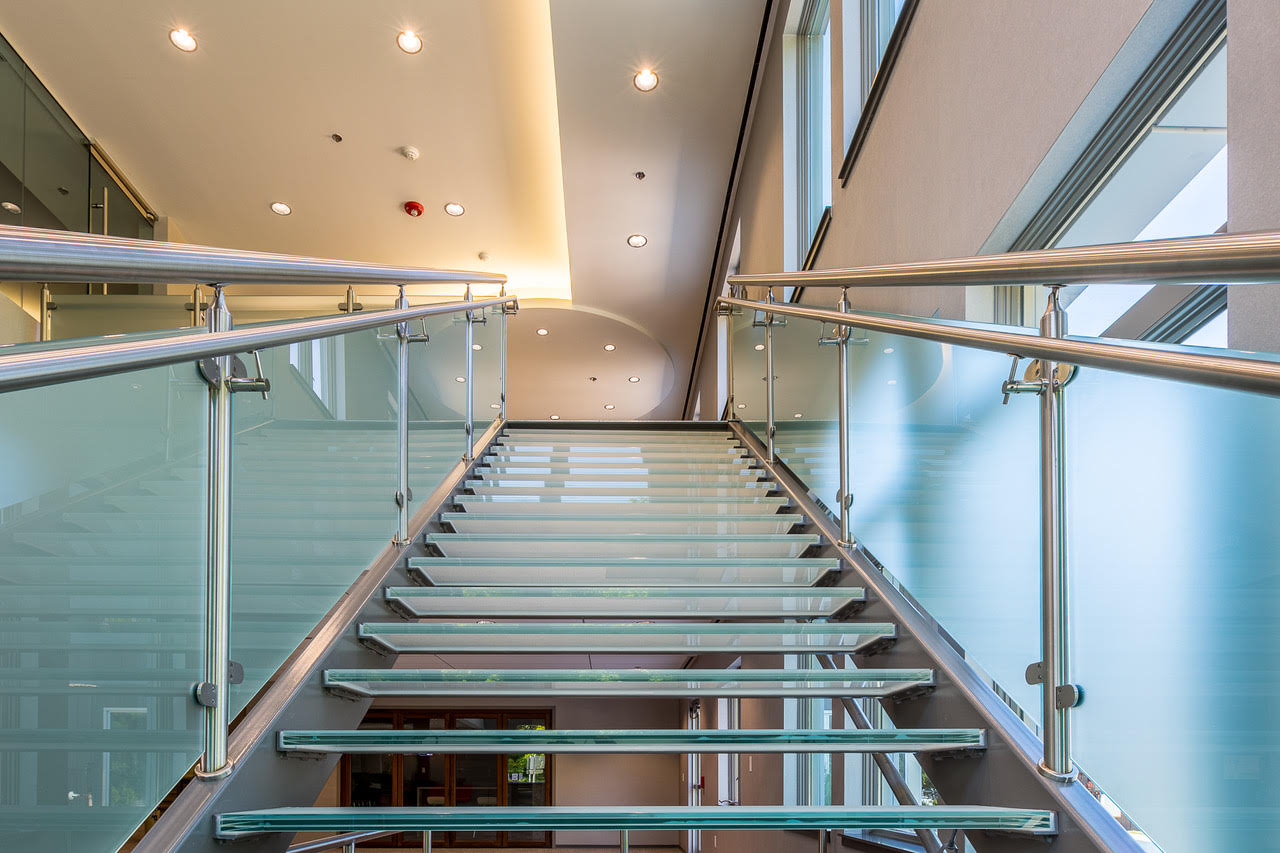
Because glass—both transparent and frosted—allows light to filter through levels of a home or business, glass flooring creates this illusion of the space being more open, airy, and large.
Fully transparent glass flooring creates this effect in the most overt and dramatic way, but even frosted privacy glass will achieve the same illusion.
This makes glass flooring a particularly effective design choice for small or narrow areas that could benefit from a more sweeping, open feel.
While innovative glass flooring projects are an increasingly popular design trend, they’re still not commonplace—in homes or businesses. This represents a unique opportunity to capitalize on the drama and novelty of glass flooring.
Interior glass floors for businesses can help a commercial space stand out. This is especially impactful in competitive industries, including restaurants, bars, and hospitality. A glass floor could be the standout element that encourages patrons to return, to spend more dollars in the business, or to speak favorably (online and in person) about the business.
For a private residence, having a unique design feature like glass flooring ensures the home doesn’t look like every other home. Glass flooring will never feel like a cookie-cutter design option because it’s a fundamentally custom, bespoke project. The residential design market is also not saturated with glass as an architectural flooring material in the way wood, tile, or laminate is.
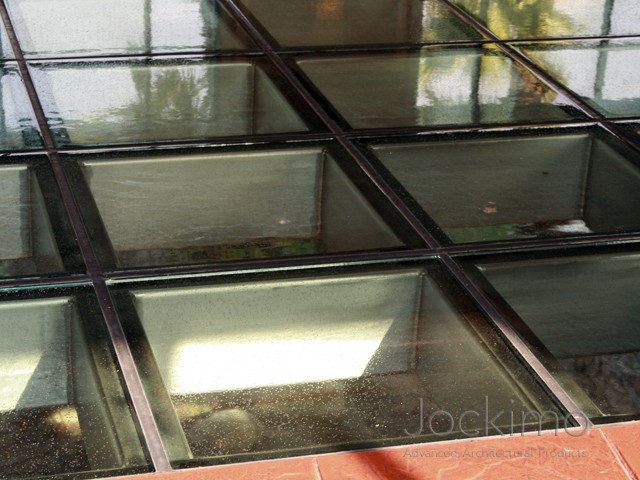
When you install glass flooring, you’re allowing natural light to travel freely throughout different levels of the space. This means your home or business gets to benefit from all the health, wellness, productivity, and financial advantages of natural light.
Glass flooring allows you to utilize daylighting in your space. When you infuse your home or business with more natural light, you can reduce your dependence on artificial lights.
This has environmental benefits, but homeowners and businesses alike can also capitalize on the financial benefits of daylighting.
Who here likes to clean? Anyone? Anyone? Yeah. Us neither.
Glass flooring is extremely easy both to clean and to maintain because of the properties of the glass itself.
As a hydrophobic material, you don’t have to worry about the glass staining or harboring any moisture that could lead to mold or mildew. You also don’t need excessive chemical-based cleaners to keep it looking its best. (Doing away with harsh cleaners also presents environmental benefits!)
Usually a light dusting or a quick pass with a wet mop are enough to clean anything that might have accumulated on the glass floor surface.
Interested? Learn more about how to clean glass floors.
Glass is a desirable flooring material because it is so customizable.
You have many options in terms of:
- Panel size
- Panel shape
- Color or level of transparency
- Antislip coating
If you’re not sure you can achieve what you want with your glass flooring, talk to an expert in architectural glass products. They can give you insight and guidance about everything from maximum glass panel dimensions to the engineering requirements around the support system.
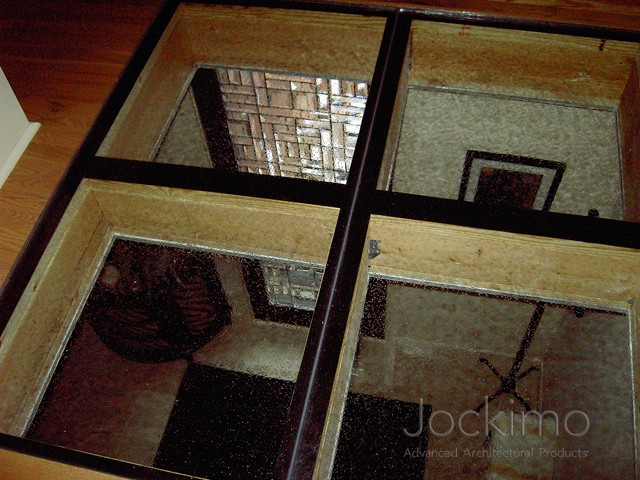
Glass is a good thermal insulator. This essentially means it’s a bad conductor of heat. Glass can help prevent heat loss in a room, which could result in financial energy savings and environmental benefits.
Glass will also stay cooler than other types of flooring material, such as wood, even in direct sunlight. This makes it an ideal candidate for either interior or exterior flooring.
Glass is a nonporous hydrophobic material. What does that mean? It’s resistant to water or any other liquid penetrating its surface. This makes glass a much more hygienic material because you don’t have to worry about mold, mildew, or anything else accumulating within the glass itself.
Because it’s excellent at repelling water, it can also keep moisture away from any subflooring or substructure.
Another major benefit of glass being hydrophobic is that it won’t stain. Especially in restaurants or bars, this means wine, oils, and acidic foods or beverages can land on the floor, and you don’t have to worry.
Even the foods and beverages that are the most notorious for staining (tomato sauce, wine, coffee, mustard) won’t leave any lasting discoloration on glass.
Clean up the spill with a damp rag, and the floor is as good as new.
If you’ve ever seen a shower door after being exposed to hard water, you know mineral build-up (also called “etching”) can be extremely unsightly.
To ensure your glass flooring stays pristine and free of calcium and sodium leaching, make sure it’s properly treated with an anti-scratch surface. This will keep your floors looking like new even many years after installation.
Even with the growing popularity of glass floors, many still worry about the panels shattering or breaking under the weight of people walking on them. Again, when properly designed, manufactured, and installed, glass floors are perhaps more exhilarating but just as safe as other flooring materials.
No material is guaranteed to be completely indestructible, but glass is very strong in compression. This means it can bear weight extremely well.
Even when used in commercial settings, it’s extremely unlikely the impact exerted on the floor would be enough to break even a single panel.
Have Any Questions about Glass Flooring?
Wondering if glass floors would be right for your home? Thinking about incorporating glass flooring into your next commercial design?
If you have any questions about this material, don’t hesitate to reach out.
We’re Jockimo, a custom glass manufacturer, and we’re always happy to answer questions, to provide estimates, or to talk about what’s possible with your next project!


